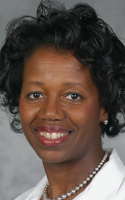Geriatrics is now a department of its own at Upstate Medical University
By Deborah Jeanne Sergeant

In consideration of the ever-growing baby boomer population, Upstate Medical University has recently opened geriatrics as a clinical department, joining the ranks of other Upstate specialties like surgery, psychiatry, neurology and neurosurgery.
Geriatrician Sharon Brangman, a SUNY distinguished professor, has led Upstate’s sub-division of geriatrics for the past 20 years and as of July 1, she is chairwoman of the department of geriatrics. She has also served as a past president of the American Geriatrics Society.
She views geriatrics as a multi-faceted specialty.
“I think the mission of geriatrics is broad enough to intersect at all the departments, except maybe pediatrics,” Brangman said. “I’m hoping to work with the others specialists to focus care on older adults and look at the hospital environment to make sure it’s welcoming and appropriate for older adults since we live in a part of the state with a high concentration of older adults.”
During her tenure at Upstate, Brangman has led Upstate in developing its geriatric emergency medicine care to provide emergency care to older adults. The organization has also received recognition as a NICHE (Nurses Improving Care for Healthsystem Elders) for its service by geriatric-trained nurses. Upstate also developed multi-faceted ACE (Acute Care for the Elderly) health care team. Upstate also offers a transitional care unit for patients doing well, yet not ready for discharge.
Brangman said the department will work to develop new curriculum to provide other departments more education in and exposure to geriatric patients and to include interns and residents in more interactions with older patients.
“Everyone will be taking care of older people,” Brangman said. “That is the reality of medical care. Since people are living longer and we’re in the midst of an aging baby boomer population, older people will receive all sorts of care. Every aspect of our medical system needs to identify their needs to do well.”
Previously, geriatrics was a sub-division under the department of medicine. The move to an independent geriatrics department marks SUNY Upstate’s recognition of the growth among the baby boomer generation.
According to the US Census Bureau, the baby boomer generation will all be older than 65 by 2030 — just 12 years away. That shift seems even more important when compared with the number of young people in the near future. By 2035, the nation will have more people over 65 than people younger than 18.
The National Council on Aging states on its website that 80 percent of older adults has at least one chronic disease. Many of those have more than one chronic disease to manage. Among those is Alzheimer’s disease.
Upstate also plans to increase its emphasis on Alzheimer’s research and treatment. Plans to break ground for a new building for this purpose are in the works.
According to the Alzheimer’s Association, 5.7 million Americans currently have Alzheimer’s. The organization projects that by 2050, that figure will increase to almost 14 million.
Upstate also plans to increase its emphasis on Alzheimer’s research and treatment. Upstate plans to break ground for a new building for this purpose at the corner of Almond and East Adams streets, Nappi Longevity Institute. The facility is named for benefactors Sam and Carol Nappi.
